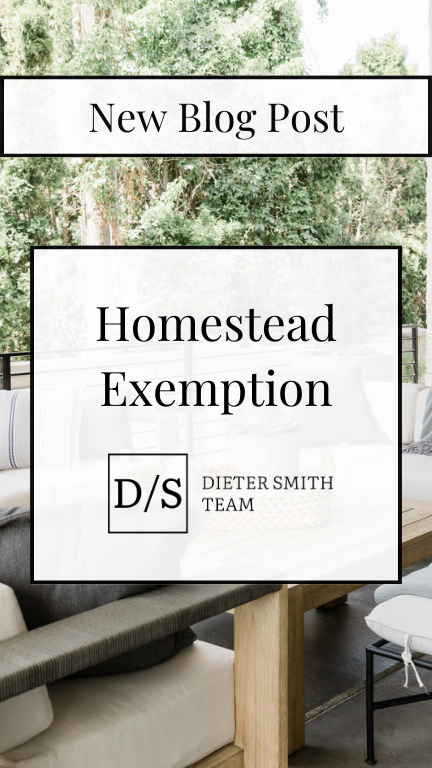
Before you purchase a house, there are a lot of financial factors to take into consideration. Memberships, utilities, down payments, closing costs, and maybe one of the most critical and long-standing, property taxes. Texas has some of the highest property taxes in the United States with the average property tax at roughly 1.86%. Those taxes are the primary source of revenue for local governments and fund local services like schools, water systems, and law enforcement.
How Does Property Tax Work?
Residential property tax is appraised annually by the district appraiser. The district appraiser is responsible for determining the current market value of all property within the district. Homes are appraised at the beginning of the year, and if you disagree with the findings of the appraisal, you can take it to the appraisal review board around the beginning of May.
Homestead Exemption
Before you purchase your home, you need to be aware of the Homestead Exemption Act for the exemption act may adjust what type of home you buy and where you purchase your home. The homestead exemption allows you to save on property taxes by allowing you to exclude a portion of your home’s value from your assessment. For example, if your home has a value of $550,000 and you qualify for a $100,000 exemption, you will pay school taxes on the house as if it was worth $450,000. Additionally, the exemption limits increases of the total assessed value (the value you are taxed on) to 10% from year to year (so long the exemption stays on the property). This 10% increase limit excludes any improvements added by the property owner.
Not all homes qualify for the exemption. Only the homeowner’s primary residence qualifies for the exemption, termed residence homestead.
Residence Homestead: The homeowner must be an individual and use the home as his or her primary residence.
If you are 65 or older or disabled, there are other exemptions you could qualify for. A homestead can include up to 20 acres as long as the homeowner owns the land and it’s used for the purpose related to the residential use of the house. A homestead can be a separate structure, condominium, or manufactured home located on owned or leased land as long as the individual owning the home lives in the home.

Available Homestead Exemptions:
- School taxes: All residence homestead owners are allowed a $100,000 homestead exemption from their home’s value for school taxes.
- County taxes: If a county collects a special tax for farm-to-market roads or flood control, a residence homestead can receive a $3,000 exemption for this tax. If the county grants an optional exemption for homeowners age 65 or older or disabled, the owners will receive only the local-option exemption.
- Age 65 or older and disabled exemptions: Individuals age 65 or older or disabled residence homestead owners qualify for a $10,000 homestead exemption for school taxes, in addition to the $100,000 exemption for all homeowners. If the owner qualifies for both the $10,000 exemption for age 65 or older homeowners and the $10,000 exemption for disabled homeowners, the owner must choose one or the other for school taxes. The owner cannot receive both exemptions.
- Optional percentage exemptions: Any taxing unit, including a city, county, school, or special district, may offer an exemption of up to 20 percent of a home’s value. But, no matter what the percentage is, the amount of an optional exemption cannot be less than $5,000. Each taxing unit decides if it will offer the exemption and at what percentage. This percentage exemption is in addition to any other home exemption for which an owner qualifies. The taxing unit must decide before July 1 of the tax year to offer this exemption.
- Optional age 65 or older or disabled exemptions: Any taxing unit may offer an additional exemption amount of at least $3,000 for taxpayers age 65 or older and/or disabled.
In short, to receive your exemption(s), you must own the property and be living on the property. You can apply any time after closing on the property to receive the tax benefits. The completed application and required documentation are due no later than April 30 of the tax year for which you are applying. A late residence homestead exemption application, however, may be filed up to two years after the delinquency date, which is usually Feb. 1.
Remember: This is a FREE service!
To get the homestead exemption, you must file the Application for Residential Homestead Exemption within your appraisal district. You have up to 2 years after the taxes on the homestead are due. New to 2024, homeowners are now required to reapply every 5 years.
If you have any questions about the homestead exemption, please reach out to our team here.
Exemption Forms by County:
Collin County Homestead Exemption Form
Cooke County Homestead Exemption Form
Dallas County Homestead Exemption Form
Denton County Homestead Exemption Form
Ellis County Homestead Exemption Form
Grayson County Homestead Exemption Form
Hunt County Homestead Exemption Form
Johnson County Homestead Exemption Form
Kaufman County Homestead Exemption Form
Rockwall County Homestead Exemption Form
Tarrant County Homestead Exemption Form
Wise County Homestead Exemption Form
